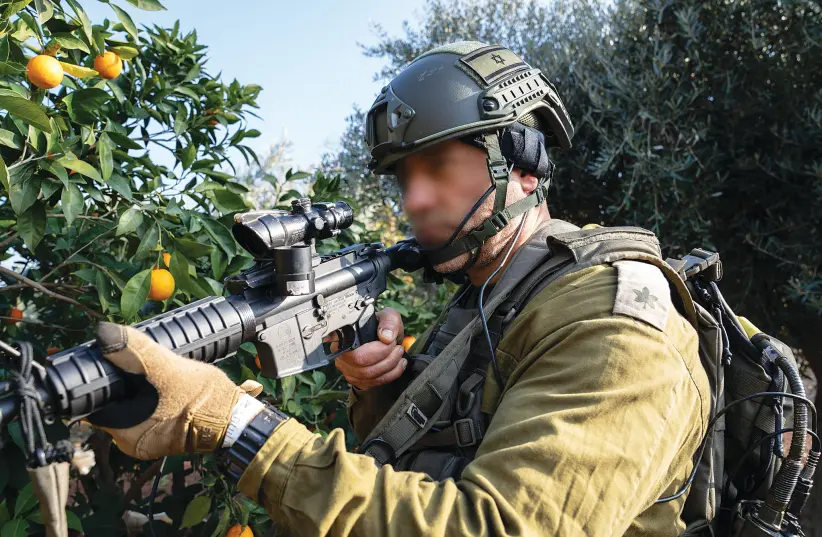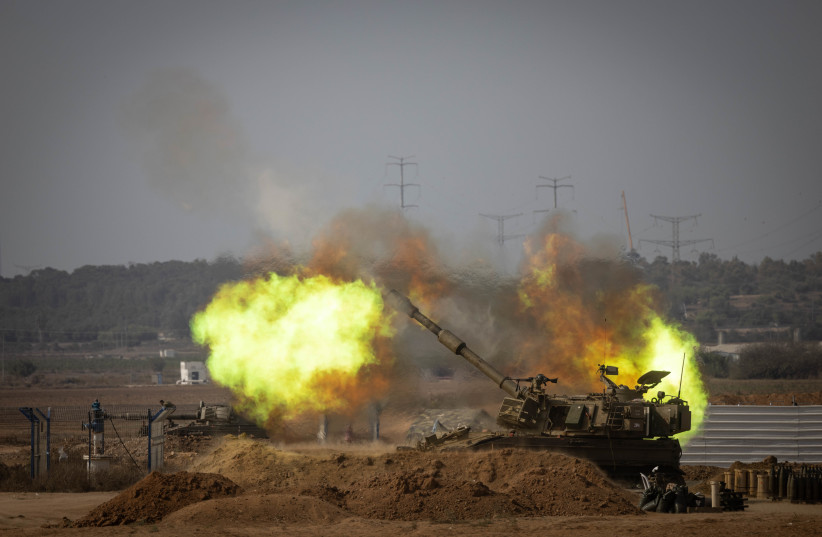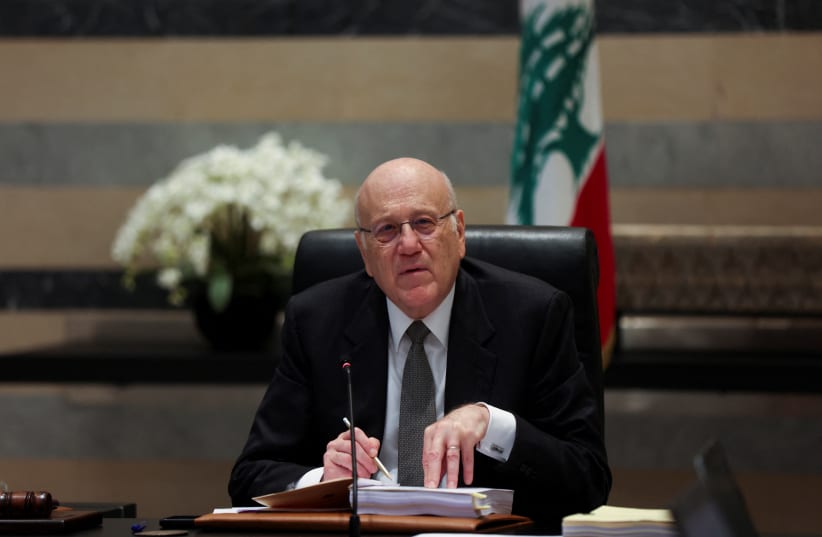Foreign
Hezbollah in Lebanon: Israel’s greatest threat on its quietest border

MILITARY AFFAIRS: Though Iran still grabs more headlines, most defense establishment officials still emphasize that Hezbollah is Israel’s greatest threat.
It is a slow and constantly unfolding chess match.

Luckily, however, it is only an IDF drill to bolster Israel’s capabilities to secure the Lebanese border, conducted by the IDF’s Unit 769 and special Devorah Unit.
As recently witnessed by The Jerusalem Post near Metulla, the drill provided clear reminders throughout that the Hezbollah danger is real and as close as can be.
Soldiers were positioned strategically throughout Metulla and spread along the border fence that cuts through the town. They were playing out a scenario where Hezbollah has already fired at and struck parts of the North, including key roads and sensitive facilities, and attempted to invade border villages.
Though Iran still grabs more headlines, most defense establishment officials still emphasize – behind closed doors and sometimes publicly – that Hezbollah, with its approximately 150,000 rockets and Radwan special invasion forces, is Israel’s greatest threat.
The Devorah Unit is made up of IDF reservists who are veterans of elite units and who live in the North, which helps personalize the conflict, as they bring an intense and personal commitment to protect the border from danger.
The unit’s commander, Maj. O., was born in the North, in Beit Hillel, and lives in She’ar Yashuv, which is located in the Upper Galilee in the northeastern Hula Valley, about 15 kilometers from Metulla – meaning from the border, which, despite the grave threat, has been Israel’s quietest border since the 2006 Second Lebanon War.
Although most Israelis at the time viewed that war as a failure, nearly all IDF officials today say that it was the most successful of Israel’s wars over the last 16 years, because it has kept Hezbollah deterred.
Married, with three kids, O. works in his family’s business in agriculture and tourism.
“I am here always. I don’t know anything at all other than the North. I have experienced all the different eras,” he said.
“All of my family is in security,” he continued. “When I was a child, my father was a security commander in our village, which was capable of defending itself [and had] all of the necessary equipment, to the point that we joked it was as if” the village was a secured fortress.
He said that, over the years, he has experienced many incidents of being under Katyusha rocket fire.
“I, personally, was never harmed, but there were always Katyushas around. One landed directly across the street from my house, another near my car. I grew up in the shadow of Katyusha rockets.
“Once, a Katyusha rocket killed some cows of my neighbor and also led a shocked driver nearby to run over my dog,” he recounted.
In those days, O. would often run to a community bomb shelter. Now, he said, all of the residents have their own safe rooms connected to their residences. Half joking, he said, “I miss seeing my friends who I used to see in the community bomb shelter” when Katyushas were fired.
He said he did his obligatory IDF service in the Northern Command’s Golani Brigade, noting it was fun because this meant he could drop in to get coffee from home and sleep at his house on a daily basis, instead of having to sleep on the base like out-of-towners.
Also, he said that his brother had served in a parallel Golani unit – O. was in Unit 13, and his brother Unit 12 – which allowed the two of them to sometimes make plans in a seamless way, crossing the bureaucratic lines.
Further, he said that in the past he could meet up with his father at the Egel crossing near Kfar Yuval, since his father was serving in the reserves in Lebanon.
O. did some IDF reserve duty and spent some time as a security officer in various overseas locations. But he eventually returned to the Israeli North and asked “How can I fully get back into” defending Israel’s border? The challenge was that his own village was near, but not on, the border.
Then he attended a conference where speakers discussed forming a special unit of IDF reserve duty soldiers who live in the area, “a group of true combat troops.”
He said that he helped bring a number of friends and local people he knew into the new unit, starting off as the unit’s deputy commander and eventually emerging as its commander. He said that 90% of the unit is composed of local fighters. This means that the unit’s soldiers can move from their homes to being assembled at the border in only 15-30 minutes.
This is breakneck speed and faster than even the most rapid, more formal system could possibly move.
Moreover, he said that they train in a formal setting multiple times a year, in addition to regular informal training, as opposed to many reservists who often do only one major training stint per year.
Committing to the regular informal training in order to be in better physical condition than regular infantry units appeared to be both part of the fun and camaraderie and a precondition for joining the special unit. But many locals are attracted to the unit because of the close ties between the soldiers and the ability to participate in reserve duty while still living at home.
O. emphasized that the unit is selective in a number of other ways, including ensuring that any new recruits fit in well with the group and have clear reasons for remaining in the North on a long-term basis.
Part of being in a special unit means having high-quality, new equipment.
O. described a complex life of always being in the face of massive danger from Hezbollah, while in practice also being on the quietest border of conflict since after the 2006 Second Lebanon War.
REGARDING MOUNT DOV, he said there have been “unwritten rules” in which Hezbollah would be allowed to make more mischief in occasionally taking shots at Israeli forces, but he said this must be opposed and stopped.
Discussing current Hezbollah threats in more detail, he said, “We know they are here, the Radwan commandos, and if there are rockets, there is no time to evacuate to a bomb shelter,” because Metulla is so close to the border.
“Hezbollah is on the fence, so we get ready for everything. It is very real. Any unpredictable hit in the ‘war between the wars’ campaign [with Syria] could lead to a giant Lebanon conflict. One Katyusha rocket hits a kid’s kindergarten in Metulla or one anti-tank missile hits someone in Misgav Am.”
Maj. O. O. also said, “Hezbollah is on the fence, so we get ready for everything. It is very real. Any unpredictable hit in the ‘war between the wars’ campaign [with Syria] could lead to a giant Lebanon conflict. One Katyusha rocket hits a kid’s kindergarten in Metulla or one anti-tank missile hits someone in Misgav Am,” and the whole region could be on fire.
“Hezbollah soldiers gained experience in Syria. They are more independent operators, have heavier firepower, use lookouts, battle formations. If Radwan got to Metulla…,” he said, trailing off as if finishing the thought was too dark of an option.
Moreover, he warned, “We are very close. We know that they can make a comeback. Metulla has dilemmas. It does not take a [brilliant military leader like] Napoleon to see that Hezbollah can invade from three to four directions, as well as [Metulla] being hit by rockets.”
On the other hand, “Hezbollah has stopped using their tunnels. We took away their ‘atomic bomb,’” he said with pride.
Regarding Nasrallah, O. said it is important for him to feel as though he is setting the agenda and the narrative to be, “‘I saved Lebanon, and I got the IDF to evacuate. I will conquer the Galilee.’ He has big rhetorical flourishes” about the Galilee and “saving Lebanon’s access to its gas.”
In analyzing the natural gas deal, he said that the IDF doesn’t seem to think there will be war tomorrow, because Nasrallah does not want a direct full conflict. At the same time, he cautioned that there is no formal obstacle to such a conflict breaking out, so many smaller incidents could accidentally lead to broader fighting.
But he said that Hezbollah started building new positions a few months ago, which they are using as lookouts. “There is a feeling that they are coming back,” in terms of actively patrolling the border and studying IDF border activities.
The lesson appeared to be that the quiet could be deceiving and temporary, and having O., his forces and others constantly training and at the ready is the only true way to remain safe. •

























